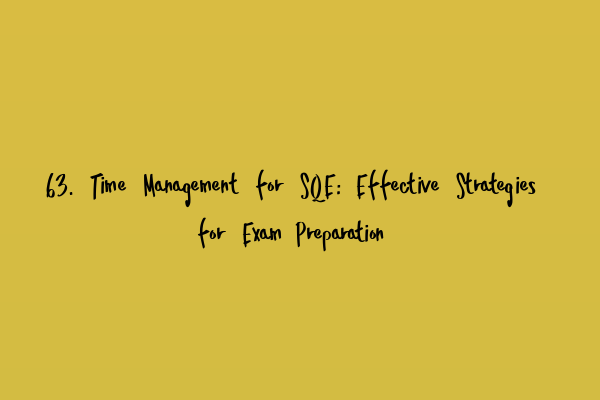63. Time Management for SQE: Effective Strategies for Exam Preparation
When it comes to preparing for the Solicitors Qualifying Exam (SQE), effective time management is crucial. With a substantial amount of material to cover and limited time available, having a well-structured study plan and utilizing efficient strategies can make all the difference in your exam performance. In this article, we will explore some essential time management strategies specifically tailored to help you excel in the SQE.
1. Create a Study Schedule
A study schedule is the foundation of effective time management. It enables you to allocate dedicated time slots for each subject, ensuring comprehensive coverage of all the necessary topics. Start by assessing the total time you have available for study. Divide your study time into manageable periods, such as hours or half-hours, and assign specific subjects or topics to each time slot. Be sure to consider your own personal preferences and energy levels when creating your schedule to optimize your study productivity.
If you’re unsure about how to structure your study schedule or need assistance in organizing your time effectively, consider seeking guidance from professional SQE training providers who offer specialized courses to help you master time management skills for the exam. Check out our article on Mastering Time Management in SQE: Strategies for Efficient Exam Completion for further insights.
2. Prioritize High-Impact Topics
Not all topics within the SQE carry equal weight. Some subjects or areas may have a higher likelihood of appearing in the exam and contribute more significantly to your overall score. Identify these high-impact topics and prioritize them in your study plan. Allocate more study time to these subjects, ensuring that you thoroughly understand the underlying principles, relevant case law, and procedural considerations.
To gain further insights into high-impact topics and their relevance, refer to our comprehensive guide on Conquer the Multiple Choice Questions (MCQ) in SQE1. This article will help you understand the question patterns and focus your efforts on areas that are more likely to be tested.
3. Take Regular Breaks
While it may seem counterintuitive, taking regular breaks during your study sessions can actually enhance your overall productivity. Studies have shown that our concentration and retention abilities tend to decline after extended periods of focused study. By incorporating short breaks into your study routine, you allow your brain to recharge, improving its ability to absorb and retain information.
When taking breaks, engage in activities that help you relax and clear your mind. This could include going for a walk, practicing mindfulness exercises, or even engaging in a brief workout. Find what works best for you and integrate these rejuvenating breaks into your study schedule.
4. Use Effective Revision Techniques
As the exam approaches, your focus should shift from comprehensive study to targeted revision. Effective revision techniques can help you consolidate your knowledge and ensure that you retain key information when it matters most. Experiment with different revision strategies, such as flashcards, mind maps, and summarizing complex topics in your own words.
Our article on Mastering Effective Revision Techniques for SQE Success discusses various revision methods in detail, enabling you to identify the techniques that resonate with your learning style.
5. Practice Scenario-Based Questions
The SQE places a significant emphasis on scenario-based questions, requiring you to apply legal principles to practical situations. Familiarizing yourself with these types of questions can greatly enhance your problem-solving skills and improve your chances of success. Dedicate time to practicing scenario-based questions and work on developing a systematic approach to analyzing the scenarios and applying relevant legal concepts.
For comprehensive guidance on tackling scenario-based questions, refer to our article on Scenario-Based Questions SQE2: Enhance Your Problem-Solving Skills. This resource will provide you with valuable insights and techniques to excel in this crucial segment of the exam.
6. Seek and Utilize Feedback
Feedback is an invaluable tool for self-improvement. Actively seek feedback on your practice exams, assignments, or mock assessments and use it to identify areas for improvement. Understand your strengths and weaknesses and adjust your study plan accordingly. Feedback can be obtained from tutors, peers, or professional SQE training providers.
For a detailed understanding of the importance of feedback and how to extract valuable insights from it, read our article on Understanding SQE Feedback: Extracting Valuable Insights. This will help you make the most of the feedback received and fine-tune your preparation for the exam.
Conclusion
Effective time management is the key to success in the SQE. By creating a study schedule, prioritizing high-impact topics, taking regular breaks, utilizing effective revision techniques, practicing scenario-based questions, and seeking feedback, you can optimize your preparation and maximize your chances of achieving outstanding results.
Remember, the SQE is a demanding examination, and a well-structured approach towards time management is essential to excel. With dedication, persistence, and the right strategies, you can confidently navigate this exam and pave your way to a successful legal career.
